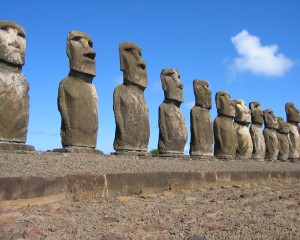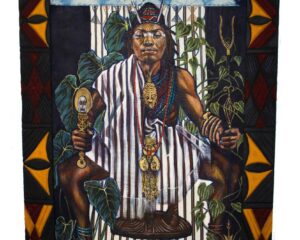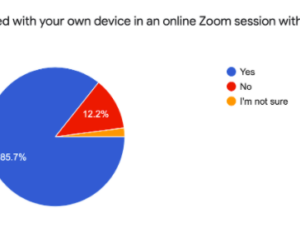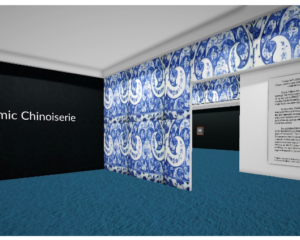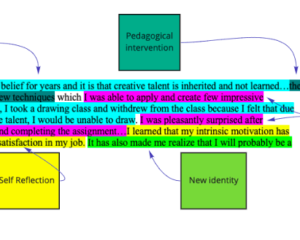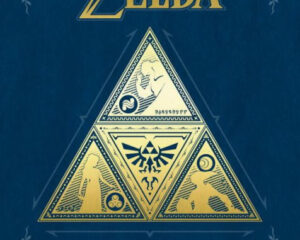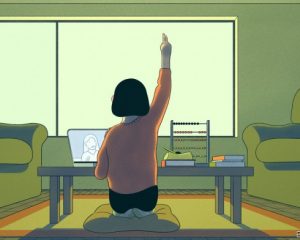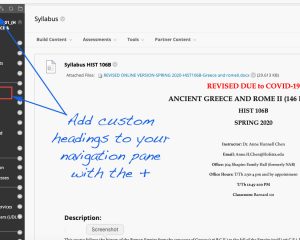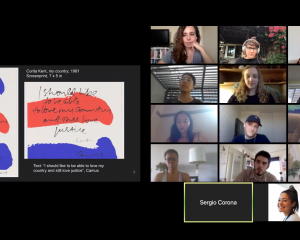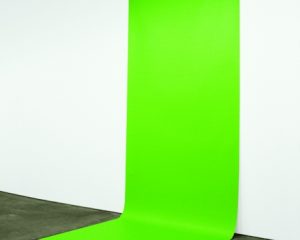Art History Teaching Resources (AHTR)
is a peer-populated platform for art history teachers. AHTR is home to a constantly evolving and collectively authored online repository of art history teaching content including, but not limited to, lesson plans, video introductions to museums, book reviews, image clusters, and classroom and museum activities. The site promotes discussion and reflection around new ways of teaching and learning in the art history classroom through a peer-populated blog, and fosters a collaborative virtual community for art history instructors at all career stages.
-
Lesson Plan
Reflection
Re-Teaching Rapa Nui
October 30, 2021
by Ellen C. Caldwell see the complete lesson plan here In January of 2020, just before the world would be unalterably impacted by COVID-19, I had the great fortune of traveling to Rapa Nui. Having taught art history surveys with an emphasis on Polynesian and Oceanic art for over a decade, I had dreamt of […]
-
Announcement
Revealing Museums — Together
February 19, 2021
How do public art museums function today? Who selects the objects on display and defines the stories that are (de)constructed? What are the value systems underpinning how museum collections and exhibitions operate? Join a three-part series of live online conversations with artists, students, and staff of the MFA Boston, exploring some of the critical questions, structures and processes that guide our museum work today.
-
CAA
SoTL
CAA 2021
February 5, 2021
By Aly Meloche and Francesca Albrezzi February 10th marks the beginning of a CAA annual meeting that promises to be unlike any other. Normally, many of us look forward to the annual meeting as an opportunity to catch up with colleagues from around the world and hear new ideas for research and teaching. It’s strange […]
-
Online Teaching
Baptism by Fire: Tips and Tactics from My First Time Teaching Remotely
November 20, 2020
While I’ve had many years of experience working with digital tools and creating digital art history projects, the transition to distance learning provided me with an opportunity to get creative and try some things that were new. Here are a few tips and tricks that I used, which others may find useful as we continue to teach and learn in an online environment.
-
Teaching Strategies
Can COVID-19 Reinvigorate our Teaching? Employing Digital Tools for Spatial Learning
November 14, 2020
Spatial learning provides exciting possibilities, unhindered by remote learning (and perhaps unbound by it?), combining the brain’s natural aptitude for spatial thinking with the contextualization possible through virtual environments.
-
SoTL
Conducting SoTL of an online art history course: using discourse analysis of discussion boards
November 1, 2020
For those of us who are just beginning to teach online, the concept of conducting scholarship of teaching and learning in addition to all of the other new responsibilities must sound about as much fun as running a virtual meeting while trying to homeschool new math.
-
Teaching Strategies
Tool
Rethinking the Curriculum by Rethinking the Art History Survey
October 14, 2020
s a Renaissance art historian I am keenly aware of the passion that can be generated through “classic” works of art from the traditional Western survey, but it is long past the time that we stop prioritizing such a model. Doing so would not only be good for art history, but it might also offer the chance to lead by example for greater inclusivity and equity in higher education more broadly.
-
Writing About Art
Decolonial Introduction to the Theory, History and Criticism of the Arts
September 14, 2020
Written by Carolin Overhoff Ferreira, Associate Professor at the Department of History of ArtFederal at the University of São Paulo, this book “draws on texts from recent picture and image theory, as well as on present-day Amerindian authors, anthropologists and philosophers [to] question the power structure inherent in Eurocentric art discourses and to decolonize art studies, using Brazil’s arts, its theory and history as a case study to do so.”
-
Equity in Education
Online Teaching
Reflection
Student Voices
Teaching Strategies
Student Voices: The Online Switch
August 14, 2020
Author: Xavier Lopez is a queer art history student who has attended San Francisco State University and Mt. San Antonio College. He is transferring to UC Berkeley this coming fall to pursue a B.A. in Art History. With a focus on Pre-Columbian Art, Lopez hopes to further educate himself on these Indigenous cultures along with […]
-
Assignment
Lesson Plan
Online Teaching
Choose-Your-Own-Adventure Formal Analysis:Updating a Classroom Staple for the Age of Remote Learning
August 10, 2020
With some creativity and advanced planning, remote modalities can actually offer important silver linings to the art historical instructor. In particular, a well-designed, intentional rethinking of the classic formal analysis exercise has the potential to facilitate the inclusivity that we as instructors strive to foster.
-
Assignment
Online Teaching
What do you see that makes you say that?: Gallery Teaching in the (Online) Art History Classroom
July 31, 2020
This is a reflection on the Hammer Museum Student Educator’s recent shift to digital conversations about art. In the past few months, the educators have transitioned to facilitating conversations about works of art with adult and K-12 groups on Zoom. While the bodily relationship to works of art is lost in the digital sphere, aspects of the educator’s facilitation have become richer and more nuanced.
-
Online Teaching
Teaching Online Now
July 22, 2020
AHTR was founded as a space of community to share successes, failures, and reflections on teaching art history between peers. It was also founded so folks would not have to reinvent the wheel each time they taught; instead, they could expand the knowledge and experiences of colleagues. With this in mind, we have decided to devote the AHTR Weekly to teaching art history online throughout the coming academic year.
